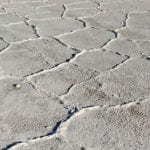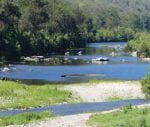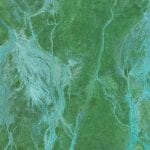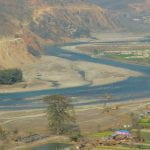The innovative approaches taken by our researchers are contributing to impactful solutions to the very real problems we are currently facing.
Dr Fiona Utley, Research+ Editor
Research+ March 2020
Featured research stories
 The science of water scarcityThe era in which growing demands for water can be met by developing new large-scale dams appears to be over. — Professor Darren Ryder, School of Environmental and Rural Science The single biggest water challenge worldwide is scarcity. The era in which growing demands for water can be met by developing new large-scale dams appears…
The science of water scarcityThe era in which growing demands for water can be met by developing new large-scale dams appears to be over. — Professor Darren Ryder, School of Environmental and Rural Science The single biggest water challenge worldwide is scarcity. The era in which growing demands for water can be met by developing new large-scale dams appears… An interdisciplinary approach to studying catchment-scale impacts on rivers and estuariesDrought and bushfires have impacted our coastal catchments in NSW, the plants and animals that they support, and the ecosystem services they provide for most of NSW’s population who live in them. Collaborative interdisciplinary science that informs government policy and engages the community is one of the best tools we have to protect these valuable…
An interdisciplinary approach to studying catchment-scale impacts on rivers and estuariesDrought and bushfires have impacted our coastal catchments in NSW, the plants and animals that they support, and the ecosystem services they provide for most of NSW’s population who live in them. Collaborative interdisciplinary science that informs government policy and engages the community is one of the best tools we have to protect these valuable… Wildlife Conservation in Rivers and WetlandsFinding solutions to mitigate threats to wildlife and help maintain ecosystem function are at the heart of UNE’s Laboratory of Applied Zoology and Ecological Restoration (LAZER) — Dr Debbie Bower, School of Environmental and Rural Science The COVID-19 pandemic has consumed every aspect of our economy and health in early 2020 as we react to…
Wildlife Conservation in Rivers and WetlandsFinding solutions to mitigate threats to wildlife and help maintain ecosystem function are at the heart of UNE’s Laboratory of Applied Zoology and Ecological Restoration (LAZER) — Dr Debbie Bower, School of Environmental and Rural Science The COVID-19 pandemic has consumed every aspect of our economy and health in early 2020 as we react to… Aquatic memories: insights from long-term records of aquatic ecosystem change can help manage our degraded river ecosystemsThe importance of Australia’s variable and unpredictable climate is less obvious … while it may take only a few years to detect a change in a stable river system, the same magnitude of change may take decades to be reliably detected in a highly variable river system — Associate Professor Michael Reid, Geography and Planning,…
Aquatic memories: insights from long-term records of aquatic ecosystem change can help manage our degraded river ecosystemsThe importance of Australia’s variable and unpredictable climate is less obvious … while it may take only a few years to detect a change in a stable river system, the same magnitude of change may take decades to be reliably detected in a highly variable river system — Associate Professor Michael Reid, Geography and Planning,… Water, Scarcity and Distributive JusticeTheories of distributive justice explore how the benefits and burdens produced collectively, and consumed individually or by specific groups, should be allocated. — Professor Adrian Walsh, School of Humanities, Arts and Social Sciences The extreme drought which has affected large parts of Australia over the past two years or so—threatening our eco-systems, our agriculture and…
Water, Scarcity and Distributive JusticeTheories of distributive justice explore how the benefits and burdens produced collectively, and consumed individually or by specific groups, should be allocated. — Professor Adrian Walsh, School of Humanities, Arts and Social Sciences The extreme drought which has affected large parts of Australia over the past two years or so—threatening our eco-systems, our agriculture and… The Future of HouseworkWe need new arrangements of life and work: a completely new economy. — Dr Jennifer Hamilton, School of Humanities, Arts and Social Sciences How does your domestic water use relate to a planet in crisis? Twelve months ago such a question might have seemed nonsensical, but it has quickly taken on new significance. During Armidale’s…
The Future of HouseworkWe need new arrangements of life and work: a completely new economy. — Dr Jennifer Hamilton, School of Humanities, Arts and Social Sciences How does your domestic water use relate to a planet in crisis? Twelve months ago such a question might have seemed nonsensical, but it has quickly taken on new significance. During Armidale’s…
Graduate researchers featured stories
 Waterholes as critical features of dry land river systemsWaterholes are often the only source of water in what is an otherwise arid environment. — Marita Pearson, HDR Candidate, School of Environmental and Rural Science Waterholes are an important biophysical feature of dryland river systems. They are often the only source of water in what is an otherwise arid environment and as such they provide…
Waterholes as critical features of dry land river systemsWaterholes are often the only source of water in what is an otherwise arid environment. — Marita Pearson, HDR Candidate, School of Environmental and Rural Science Waterholes are an important biophysical feature of dryland river systems. They are often the only source of water in what is an otherwise arid environment and as such they provide… Ecosystem services and climate change in the Koshi river basin, NepalRivers and their associated floodplains are recognised among the world’s most valuable landscapes in terms of ecosystem services — Sagar Bajracharya, HDR Candidate, Geography and Planning, School of Humanities, Arts and Social Sciences Ecosystem services are the benefits people gain from the environment. These benefits can be separated into ‘supporting services’ (e.g., biogeochemical cycling, biodiversity,…
Ecosystem services and climate change in the Koshi river basin, NepalRivers and their associated floodplains are recognised among the world’s most valuable landscapes in terms of ecosystem services — Sagar Bajracharya, HDR Candidate, Geography and Planning, School of Humanities, Arts and Social Sciences Ecosystem services are the benefits people gain from the environment. These benefits can be separated into ‘supporting services’ (e.g., biogeochemical cycling, biodiversity,…
